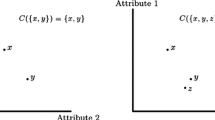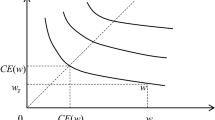Abstract
We present an axiomatic model of preferences over menus that is motivated by three assumptions. First, the decision maker is uncertain ex ante (i.e., at the time of choosing a menu) about her ex post (i.e., at the time of choosing an option within her chosen menu) preferences over options, and she anticipates that this subjective uncertainty will not resolve before the ex post stage. Second, she is averse to ex post indecisiveness (i.e., to having to choose between options that she cannot rank with certainty). Third, when evaluating a menu she discards options that are dominated (i.e., inferior to another option whatever her ex post preferences may be) and restricts attention to the undominated ones. Under these assumptions, the decision maker has a preference for commitment in the sense of preferring menus with fewer undominated alternatives. We derive a representation in which the decision maker’s uncertainty about her ex post preferences is captured by means of a subjective state space, which in turn determines which options are undominated in a given menu, and in which the decision maker fears, whenever indecisive, to choose an option that will turn out to be the worst (undominated) one according to the realization of her ex post preferences.
Similar content being viewed by others
References
Debreu G. (1954) Representation of a preference ordering by a numerical function. In: Thrall R., Coombs C., Davis R. (eds) Decision processes. Wiley, London
Dekel E., Lipman B. L., Rustichini A. (2001) Representing preferences with a unique subjective state space. Econometrica 69(4): 891–934
Dekel E., Lipman B. L., Rustichini A. (2009) Temptation-driven preferences. Review of Economic Studies 76(3): 937–971
Dekel E., Lipman B. L., Rustichini A., Sarver T. (2007a) Representing preferences with a unique subjective state space: A corrigendum. Econometrica 75: 591–600
Dekel, E., Lipman, B. L., Rustichini, A., & Sarver, T. (2007b). Supplement to representing preferences with a unique subjective state space: Corrigendum, Econometrica Supplementary Material, 75.
Dubra J., Maccheroni F., Ok E.A. (2004) Expected utility theory without the completeness axiom. Journal of Economic Theory 115(1): 118–133
Eliaz K., Ok E. A. (2006) Indifference or indecisiveness? Choice-theoretic foundations of incomplete preferences. Games and Economix Behavior 56(1): 61–86
Epstein L., Marinacci M., Seo K. (2007) Coarse contingencies and ambiguity. Theoretical Economics 2: 355–394
Ergin H., Sarver T. (2010) A unique costly contemplation representation. Econometrica 78(4): 1285–1339
Guerdjikova A., Zimper A. (2008) Flexibility of choice versus reduction of ambiguity. Social Choice and Welfare 30: 507–526
Gul F., Pesendorfer W. (2001) Temptation and self-control. Econometrica 69(6): 1403–1435
Klein E., Thompson A. C. (1984) Theory of correspondences: Including applications to mathematical economics. Wiley, New York
Kreps D. M. (1979) A representation theorem for preference for flexibility. Econometrica 47(3): 565–577
Nehring K. (1999) Preference for flexibility in a Savage framework. Econometrica 67: 101–119
Ortoleva, P. (2010). The price of flexibility: Towards a theory of thinking aversion. mimeo.
Ozdenoren E. (2002) Completing the state space with subjective states. Journal of Economic Theory 105: 531–539
Rockafellar R. T. (1970) Convex analysis. Princeton University Press, Princeton
Sarver T. (2008) Anticipating regret: Why fewer options may be better. Econometrica 76: 263–305
Schneider R. (1993) Convex bodies: The Brunn-Minkowski theory. Cambridge University Press, Cambridge
Author information
Authors and Affiliations
Corresponding author
Rights and permissions
About this article
Cite this article
Danan, E., Guerdjikova, A. & Zimper, A. Indecisiveness aversion and preference for commitment. Theory Decis 72, 1–13 (2012). https://doi.org/10.1007/s11238-011-9254-7
Published:
Issue Date:
DOI: https://doi.org/10.1007/s11238-011-9254-7




